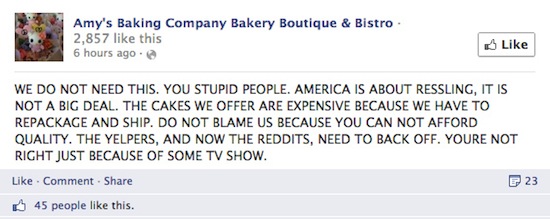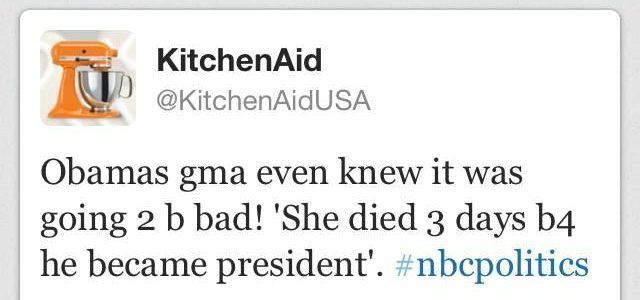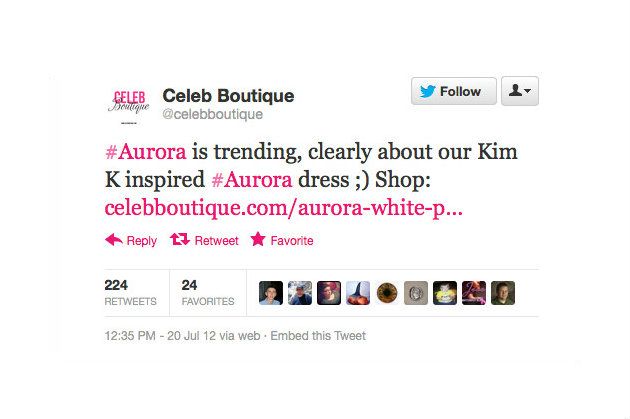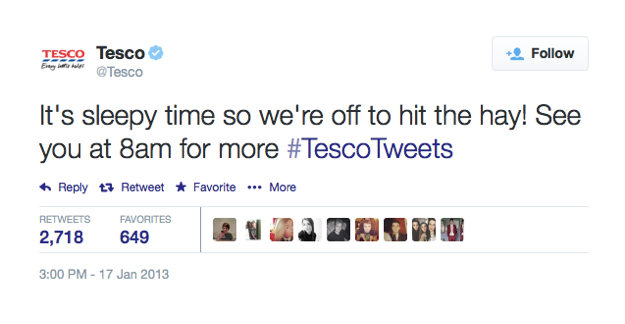How you can learn from social media mistakes
We’ve covered many times how social media is a great tool and one that can be used for social good. However, like all tools, social media isn’t inherently good nor bad, it’s about how you use them.
Sometimes, social media isn’t used to its full potential and being human, people make mistakes. Here are a few examples of such. Learn from them, and avoid making them.
Amy’s Bakery Boutique

What they did
Communicating with those who support you is a key tenant of running a successful charity in the age of the internet. Facebook is a great tool for conversing with those who follow you, but can also be one that can be misused. Amy’s Baking Company Bakery Boutique & Bistro, an American restaurant, found this out recently after they were featured on an episode of Gordon Ramsey’s Kitchen Nightmares. Following an unfavourable portrayal on the programme their Facebook page was inundated with comments.
In response to the negative comments the company posted a status that portrayed themselves as victims. When this tactic failed, things turned sour: the company posted a series of statuses that insulted, threatened and swore at the commenters in all caps. As a result this rant got the attention of Reddit and similar sites, which turned the tirade viral and the faux pas worldwide.
What can be learnt
Social media isn’t a place for self-promotion, it’s a place for conversing with your audience. If a mistake is made, it’s best just to own up to it and apologise. Refusing to acknowledge any problems you may face and blaming those who support you will only cause more problems. While Amy’s Bakery Boutique may have already suffered a substantial loss in reputation by appearing on television, their social media outburst made their name infamous across the globe. (It should be noted that the company claim that their Facebook page was hacked.)
Kitchen Aid

What they did
During the US presidential elections in 2012 an American home appliance brand called KitchenAid sent an offensive tweet regarding Barack Obama’s late grandmother. There was an instant backlash from the brand’s followers, with many planning to boycott the brand while others merely complained about the tweet. Kitchen Aid quickly deleted the tweet, which it claimed was accidentally posted by an employee who believed they were using their personal account, and apologised both to its followers and personally to Barack Obama.
What can be learnt
Social media has become near ubiquitous; almost all companies use it and almost all employees do too. So it’s inevitable that someone is going to get mixed up from time to time and post from the wrong account, especially if that person is using software like Hootsuite or Tweetdeck to manage multiple accounts. It’s likely that any tweet from the wrong account would be a mundane one that could be deleted without fuss. However, if it’s an offensive one then it may require more attention. KitchenAid managed the situation quickly and effectively by being transparent and acknowledging their mistake.
Celeb Boutique

What they did
CelebBoutique noticed that the word aurora was trending on Twitter, which coincidentally was the name of one of the dresses they sold. They attempted to capitalise on this coincidence with a flippant tweet implying that the trend was due to the dress. Unfortunately, the trend was actually caused by a mass shooting at a cinema in the town of Aurora in America in which 12 people were killed and 58 people injured. CelebBoutique responded by deleting the offending tweet, apologising and explaining that their PR was non-US based and were unaware of the incident.
What can be learnt
Twitter is all about being timely. A quick tweet about something topical can be a great way to foster conversation. But as CelebBoutique proved, it’s easy to be too hasty when sending out tweets. Mistakes like CelebBoutique’s can be easily avoided with a simple bit of research – finding out why topics are trending takes only a few seconds. Don’t let the rush and speed of social media force you into mistakes. Be thoughtful and considerate with your tweets, sometimes being the first to speak isn’t always the best idea.
American Red Cross

What they did
For further proof that employees may get personal and company accounts mixed up from time to time look to the American Red Cross. Much like the KitchenAid example above, an employee from the organisation accidentally tweeted their personal thoughts from the public account. Unfortunately, these thoughts were about getting drunk on a particular type of beer and accompanied by the peculiar hashtag – #gettngslizzerd.
However, the American Red Cross quickly realised the mistake and sprung into action, deleting the tweet and following it up with a good-humoured one acknowledging their mistake. Due to the calm handling over the faux pas, many tweeters including the beer company mentioned co-opted the #gettngslizzerd hashtag and used it to drive donations to the American Red Cross.
What can be learnt
Everyone makes mistakes now and then, it’s what makes us human; but these mistakes, if handled correctly, needn’t cause any problems. The gettngslizzerd story shows that honest mistakes can be turned into something good as long as you are honest and transparent with your audience. A rogue tweet is nothing to fear, if your intentions are good then people will see that and support you regardless.
Tesco Customer Care

What they did
In early 2013 Tesco and many other supermarkets we’re under public scrutiny for selling beef burgers, produced by another company, that contained a lot less beef and a lot more horse than you’d expect. The scandal was the biggest news story of the year and dominated the headlines for days. The Tesco Customer Care team was inundated with questions and jokes at their expense and continued to respond diligently. That is until the 17th of January, four days after news of the scandal broke, when Tesco’s PR tweeted “It’s sleepy time so we’re off to hit the hay! See you at 8am for more #TescoTweets”.
Whether it was an intentional and facetious joke or just an unfortunately worded tweet is unclear, but either way it caused an uproar. Comedians seized on the situation and chaffed Tesco ceaselessly; conversely, consumers concerned by the scandal scolded the supermarket for controlling such a serious subject with such senseless carelessness.
What can be learnt
It’s important to be human, personable and funny on Twitter. But, there are times when you need to be thoroughly professional and treat things with the seriousness they deserve. When your followers are annoyed or anxious about your actions, a calm and re-assuring approach is more appreciated than a flippant one.
Rival supermarket Waitrose are a good example of how to handle Twitter with suitable flippancy. When they encouraged the use of the #WaitroseReasons hashtag, Twitter comedians immediately took notice and begun posting as many jokes about it as possible. The jokes, such as ‘I shop at Waitrose because Clarrisa’s pony just WILL NOT eat ASDA Value straw’, were mostly light-hearted in nature though and reinforced Waitrose’s brand image of being an exclusive and high-quality supermarket.
So, in a nutshell
- Be honest, and, if you’ve made a mistake apologise
- Make sure you are tweeting from the correct account
- Quickly research why something is trending
- Turn mistakes to your advantage and you’ll see the goodwill flow
